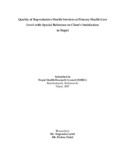Please use this identifier to cite or link to this item:
https://hdl.handle.net/20.500.14356/302Full metadata record
| DC Field | Value | Language |
|---|---|---|
| dc.contributor.author | Nepal Health Research Council (NHRC) | |
| dc.contributor.author | Luitel, Nagendra | |
| dc.contributor.author | Dulal, Bishnu | |
| dc.date.accessioned | 2013-01-01T20:48:02Z | |
| dc.date.accessioned | 2022-11-08T10:14:17Z | - |
| dc.date.available | 2013-01-01T20:48:02Z | |
| dc.date.available | 2022-11-08T10:14:17Z | - |
| dc.date.issued | 2007 | |
| dc.identifier.uri | http://103.69.126.140:8080/handle/20.500.14356/302 | - |
| dc.description.abstract | Introduction: Sexual and reproductive rights are recognized as the basic human rights. Many organizations including UN are working to ensure that these rights are achieved by all the male and female in all countries. Sexual and reproductive rights have very close and important association with development. The term "reproductive health" in a broad sense refers to the health and well-being of women and men in terms of sexuality, pregnancy, birth, and related conditions, infections and illnesses. Married and unmarried youths have common biological characteristics that affect reproductive health. Women also have a common need for accurate information about their bodies, sexuality and communication in relationships, contraceptives, pregnancy and other issues. Correct and adequate information about pregnancy, maternal and child health, family planning and other aspects of family health are milestones of improvement in community health. | en_US |
| dc.language.iso | en_US | en_US |
| dc.publisher | Nepal Health Research Council | en_US |
| dc.title | Quality of Reproductive Health Services at Primary Health Care Level with Special Reference to Client’s Satisfaction in Nepal | en_US |
| Appears in Collections: | NHRC Research Report | |
Files in This Item:
| File | Description | Size | Format | |
|---|---|---|---|---|
| 505.pdf | Full Text. Download | 694.91 kB | Adobe PDF |  View/Open |
Items in DSpace are protected by copyright, with all rights reserved, unless otherwise indicated.
